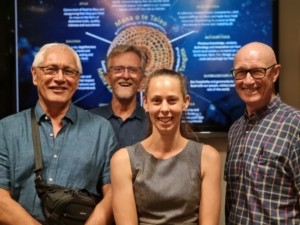- Home
- Research
- Te Kura i Awarua Rangahau Māori Centre
- EIT | Te Pūkenga Policy Think Tank discusses importance of moving from food security to food sovereignty
EIT | Te Pūkenga Policy Think Tank discusses importance of moving from food security to food sovereignty

EIT|Te Pūkenga Māori and Indigenous Research Professor David Tipene-Leach (left) with Senior Researcher Rachael Glassey (middle), Research Professor Boyd Swinburn and Synergia Founding Partner Dr David Rees (back left).
Moving from food security to food sovereignty requires mātauranga Māori and a renewal of relationships with indigenous food systems, EIT | Te Pūkenga Māori and Indigenous Research Professor David Tipene-Leach says.
Professor Tipene-Leach spoke at a Policy Think Tank on Thursday, 17 November. The Think Tank, organised by Te Kura i Awarua (Rangahau Māori Centre) and EIT Research and Innovation Centre, also heard from new EIT | Te Pūkenga Research Professor Boyd Swinburn and Dr David Rees, a founding partner of leading Australasian analytics, consulting and evaluation group, Synergia.
The Think Tank, called Food Security to Food Sovereignty, focused on why the fruit bowl of the country has masses of hungry kids and how to resolve these issues.
It centred around Nourishing Hawke’s Bay: He wairua tō te kai (NHB), a community research project led by Professor Tipene-Leach and Professor Swinburn. The project brings the added value of mātauranga Māori and systems science to intervention for children’s hauora (wellbeing).
“We want to continue our work on looking at the impact on children’s health through the Ministry of Education’s school lunch programme; Ka Ora, Ka Ako (KOKA),” said Professor Tipene-Leach.
“But we want to extend that work and move outside the schools and start to look at whānau, at rohe, communities, and the whole region, and map it in a way that we could begin to understand what was going on in the food system in Hawke’s Bay and how to press different buttons for change that might impact KOKA.”
Professor Tipene-Leach said it seems, in the Māori community, people want to get away from food security, which is about being supplied with food, to food sovereignty, which is about being in control of what happens.
The latter can be defined as a food system in which the people who produce, distribute, and consume food also control the mechanisms and policies of food production and distribution. There is an emphasis on local food economies, sustainable food availability and culturally centred food practices, he says.
Professor Boyd Swinburn, a nutrition and global health expert who has recently become part of the EIT | Te Pūkenga research team, said Hawke’s Bay is a region with amazing local food production systems, yet very poor nutritional health, especially for tamariki. He said that COVID-19 lockdowns exposed the existing food system’s lack of resilience and that “during lockdown, all the food services stopped, all the food piled up, and the money stopped for a lot of people who were just above the bread line and then dropped below the bread line.”
The result was a disconnect between a pile up of food in one area, and a lack of food in another, which the food system was not able to respond to.
“What was needed to respond to it were a bunch of volunteers, like Nourished for Nil, pulling food from one area to the other. So, it was a patch up job, on an existing food system that did not respond intrinsically to the challenge of COVID-19.”
While there are many excellent initiatives, organisations, businesses, research projects and people committed to building better food systems, Swinburn said the question that remains is, can these high-level concepts be applied to a regional level?
“So that current food systems are re-oriented towards creating greater health and wellbeing, sustainable/regenerated environments, food equity/security, and economic prosperity?”
Dr Rees spoke from a systems point of view.
“KOKA is, like many of the alternative food systems established in the Hawke’s Bay, a response to the failure of our conventional food system to supply healthy, nutritious food to our young people.”
“Instead, driven by a commercial focus, our conventional food system provides mainly highly processed, unhealthy food to those who can afford to buy it.”
Dr Rees said that the project will explore opportunities to reorientate KOKA to align more closely with mātauranga Māori values and practices, and in doing so, support the building of new food systems, rather than simply responding to the one that has failed.
The evening was well attended with almost all members of the emergency food sector represented and it concluded with a detailed exposition of how the Tihei Mauriora team supported by Ngāti Kahungunu and Civil Defence worked with up to 30,000 people over lockdown to make sure whānau didn’t go hungry.
Dr Tipene-Leach finished by saying: “We want to turn this emergency response into one that supports whānau in an ongoing fashion”.
